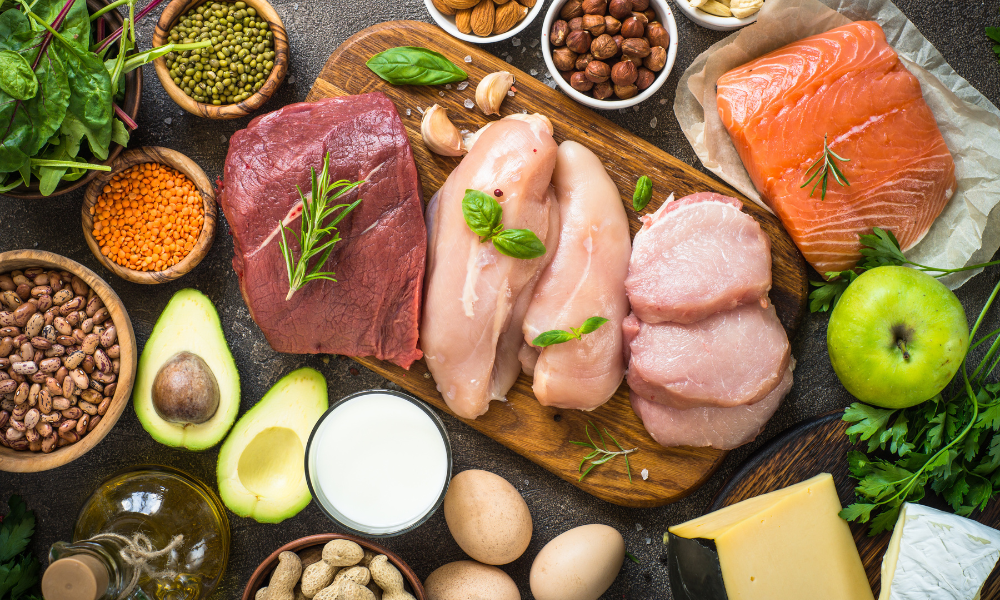

· By Renewed Health Co
Why Protein is Vital For Your Health
When it comes to maintaining a healthy and balanced diet, protein cannot be overlooked. Proteins are widely regarded as the "building blocks of life" and are essential to a host of bodily functions, which makes proteins an essential part of our diet.
What are proteins? Proteins are composed of individual molecules known as amino acids, which are necessary for numerous physiological processes within the body. There are numerous amino acids, but nine amino acids are only found in food. These are called essential amino acids. Foods containing all nine essential amino acids are called complete proteins. Beef, poultry, fish, eggs, and dairy are among them.
Physiological processes describe how organs, tissues, and cells work together. These processes range from food digestion, building and repairing body tissue, producing enzymes and hormones, supporting immune function, maintaining healthy skin, hair, and nails, building muscle, and providing an energy source when needed. Without adequate protein intake, the body may struggle to perform these functions optimally, leading to a wide range of health issues.
Building and Repairing Tissue: Protein is critical for tissue growth, repair, and maintenance. Whether it's repairing muscle fibers after a workout or healing wounds, protein provides the necessary raw materials for these processes to happen. More specifically, certain amino acids are needed in optimal amounts for these repair processes to begin.
Enzymes and Hormones: Enzymes facilitate chemical reactions within the body, while hormones regulate various bodily functions. Enzymes and hormones are often composed of proteins, emphasizing their importance for overall health. Examples are the secretion of digestive enzymes for food breakdown and the hormonal response of insulin to lower blood sugar.
Immune Function: Many components of the immune system, such as antibodies, are made up of proteins. A sufficient intake of protein supports the production of these immune molecules, enhancing the body's defense mechanisms against foreign invaders.
Gut Health: A crucial area of our immune system, the gastrointestinal barrier, which keeps foreign objects from entering the bloodstream, are composed of proteins. Breakdown of this barrier can lead to leaky gut, which results in various infections and Autoimmune reactions.
Energy Source: While carbohydrates and fats are the body's primary sources of energy, protein can also be utilized for energy when necessary. However, relying solely on protein for energy isn't ideal, as it can compromise protein's other essential roles when the body allocates protein for energy production.
The amount of protein an individual requires daily varies based on factors such as age, sex, weight, activity level, and overall health goals. The Recommended Dietary Allowance (RDA) for protein intake is approximately 1 gram per 2.75 lbs. of body weight for the average sedentary adult. That’s about 45 grams for a 125 lb. person.
For those who are physically active, engage in regular exercise, or have specific goals like bodybuilders and athletes, this recommendation is not sufficient. Active individuals require a higher protein intake to support muscle recovery and growth, joint, ligament and tendon health.
Active individuals should consume around 0.6 to 1 gram of protein per 1 lb. of body weight. That’s 75 to 125 grams of protein for a 125 lb. person. Those undergoing intense resistance training or aiming for significant muscle gain will benefit from a higher protein intake within this range.
Meeting your daily protein requirements can be achieved through a variety of dietary sources. Common sources of protein include meats, poultry, fish, eggs, dairy products, legumes (beans and lentils), nuts, seeds, and protein-based supplements like collagen or whey. Make sure the supplements you choose are derived from high quality protein sources, in order to achieve the best results.
Choose 100% grass-fed pasture raised beef, wild-caught fish, and pasture raised (or free range) poultry when consuming animal-based protein sources, as research shows these contain higher quality protein, fat and more vitamins and minerals than those fed grain and in feed-lots, farm raised fish, and poultry kept in confined, often overcrowded and unhealthy conditions.
Likewise, when it comes to plant-based proteins, always choose organic, as these sources are free of dangerous herbicides and pesticides like glyphosate, which has been banned in Europe, and linked to cancer and gut dysbiosis. Additionally, organic plant-based protein sources often contain fewer heavy metals, which can negatively impact different organs like the brain.
The role of protein in maintaining good health is vital. From muscle growth to immune defense, proteins are the heroes of our bodies' inner workings. It's crucial to understand your body's protein needs based on factors such as activity level and health goals. The key to living a healthy and vibrant life is to balance your diet with adequate protein and other essential nutrients. When it comes to protein, don't just focus on quantity, but also make informed choices aligned with your needs.
